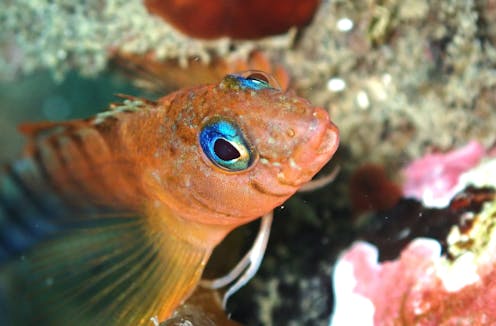Light pollution affects coastal ecosystems too – this underwater ‘canary’ is warning of the impacts
- Written by Kathleen Laura Sterup, Postgraduate in Marine Biology, Te Herenga Waka — Victoria University of Wellington

In the early 20th century, canaries were used[1] as early warning systems in coal mines to alert miners to rising levels of carbon monoxide.
A small unremarkable fish may fill a similar role in coastal ecosystems around Aotearoa New Zealand.
Triplefins, or kokopara, are common in a range of shallow coastal habitats across the country. They are a diverse group of fishes[2], with 26 endemic species living on our shores, and they make excellent “canaries” for the coastal marine environment, helping us to understand and possibly address pollution.
Research using triplefins has already shown increased consumption of microplastics[3] by fish living closer to urban areas. Studies have also identified molecular responses to multiple chemical pollutants[4] and described cognitive damage caused by loss of habitat complexity.
Noise pollution from small boats[5] also has negative effects on coastal fish. And now, new research [6] is investigating the surprising impact of light pollution on coastal ecosystems.
We are finding what is called “skyglow” affects triplefin growth patterns, with consequences for their ability to forage.
An underwater ‘canary’
Human activity around coastal waters is intense, about triple the rate of other areas[7], and it affects ecosystems such as beaches and wetlands.
Coastal urbanisation introduces a range of challenges for near-shore ecosystems, including pollutants, plastics, sound and light.
Light pollution is often recognised for the limitations it imposes on astronomers and stargazers[8], but a growing body of research has begun to document effects on the health of animals and ecosystems.
Scientists have found coastal fishes in tropical and temperate environments, including the common triplefin, reproduce and grow in a cyclical pattern which follows the monthly lunar cycle[11].
Patterns in nocturnal illumination (known as artificial light at night, or ALAN) of surface waters have a surprisingly large impact on these fish. The prevalence of light pollution from cities (in this case New Zealand’s capital Wellington) can potentially interfere with their breeding cycles.
Read more: Night skies are getting 9.6% brighter every year as light pollution erases stars for everyone[12]
Long-term trends in skyglow over the Wellington region have revealed elevated levels of nighttime illumination up to 60 kilometres from the city centre.
Analysis of triplefin samples from nearby waters has identified altered growth patterns, manifesting in different body shapes. The health consequences include decreased swimming and foraging ability and make life harder for fish developing in brighter waters.
Bright city lights
It may not seem that the effects of light on a tiny fish are a big deal, but triplefins are a clear indicator of what could be happening in other fish.
In marine ecosystems, small changes have a way of propagating further up the food chain. In the light pollution example, theory suggests small-scale, relatively short-term fluctuations in small prey species like the common triplefin are likely to appear later as long-term fluctuations in larger species at a greater spatial scale, with genuine implications for pelagic fisheries[14].
In an instance such as this, the triplefin is indeed acting as a canary for potential changes affecting the entire marine food web.
Read more: Under the moonlight: a little light and shade helps larval fish to grow at night[15]
We know what affects one fish species may not affect others. But equally, we can’t carry out experiments on every species. What the humble triplefin can tell us is that coastal ecosystems are in trouble, not just from water quality and pollution, but from the lights and sounds of our big cities.
Like the miners, we need to pay attention to the animals we use as indicators. The triplefins are asking us to embrace the dark and there are many ways[16] in which our cities can do this.
Communities can choose LED lightbulbs and shaded fixtures for street lights, so they only point down. Sensible use of dimmers and timers will help turn off unnecessary lights. In fact, Aotearoa New Zealand hosts two of the world’s few dark sky reserves, in Aoraki-McKenzie and, more recently, in the Wairarapa[17], as well as two dark sky sanctuaries (Aotea/Great Barrier Island and Rakiura/Stewart Island).
New Zealand could be on track to become the second dark sky nation[18] in the world (after Niue).
References
- ^ canaries were used (review.gale.com)
- ^ diverse group of fishes (www.nzgeo.com)
- ^ microplastics (papers.ssrn.com)
- ^ multiple chemical pollutants (www.sciencedirect.com)
- ^ Noise pollution from small boats (www.nature.com)
- ^ new research (openaccess.wgtn.ac.nz)
- ^ triple the rate of other areas (www.jstor.org)
- ^ astronomers and stargazers (darksky.org)
- ^ Wikimedia Commons/Ian Skipworth (upload.wikimedia.org)
- ^ CC BY-SA (creativecommons.org)
- ^ follows the monthly lunar cycle (royalsocietypublishing.org)
- ^ Night skies are getting 9.6% brighter every year as light pollution erases stars for everyone (theconversation.com)
- ^ Shutterstock/Hairem (www.shutterstock.com)
- ^ genuine implications for pelagic fisheries (onlinelibrary.wiley.com)
- ^ Under the moonlight: a little light and shade helps larval fish to grow at night (theconversation.com)
- ^ many ways (darksky.org)
- ^ Wairarapa (darksky.org)
- ^ dark sky nation (www.nationalgeographic.com)

















